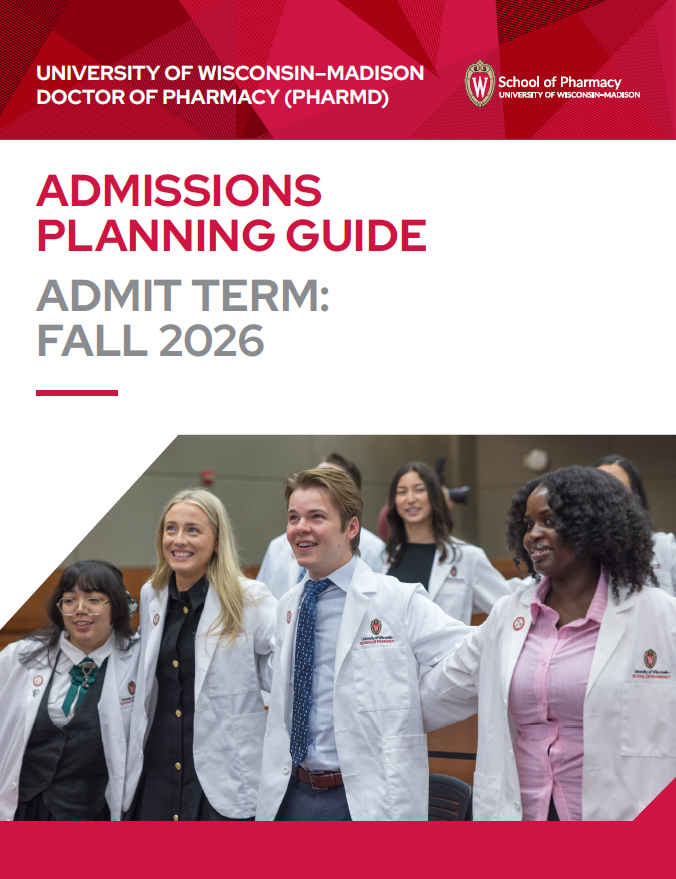Our Admissions Committee follows a holistic approach to admissions, using criteria beyond GPA to make admission decisions. Our admission process has a goal to identify committed learners who will become productive contributors to the pharmacy profession. Below you will find the criteria we use to holistically evaluate our applicants.
Academic Achievement
Applicants should establish a strong academic record. We encourage applicants to aim for grades of B or better in math and science coursework. Grades from repeated courses will be averaged with all other coursework, meaning that the repeated grade does not replace the original grade earned in the course.
There is no minimum GPA requirement. The GPA range for the most recent entering class was 2.9 – 4.0, while the average GPA was a 3.6. An applicant’s cumulative GPA includes all post-secondary courses. The Admissions Committee will also review GPA for math and science courses and GPA in each academic year.
Applicants are encouraged to enroll in a full-time course schedule, if possible, to demonstrate preparedness for the PharmD program. As part of the holistic review, the Admissions Committee will also consider grade trends, combination of courses taken per semester, total credit load, and other individual circumstances impacting academic history.
Communication Skills
Pharmacists interact daily with a broad range of patients and healthcare professionals. As a result, applicants to the PharmD program must demonstrate effective verbal and written communication skills. Application essays, recommendation letters, and an interview are used to assess each applicant’s communication skills.
Commitment to Serving all Patient Populations
Applicants are encouraged to share their personal experiences, aptitude, and commitment to becoming good global citizens. Students must be able to work alongside and serve all patient populations. Examples you can use to illustrate your commitment to being a good global citizen and an inclusive healthcare provider include:
- Critical thinking and problem solving
- Cultural awareness
- Ethical responsibility to self and others
- Empathy and compassion
- Resilience and adaptability
- Teamwork and collaboration
Experiences
Service is the cornerstone of professional life for pharmacists, and applicants should demonstrate a commitment to helping others, collaboration, leadership, and a sincere willingness to learn from others through experiences and activities. Applicants should be prepared to explain how these experiences have helped them develop specific skills and/or grow as individuals. These experiences can include, but are not limited to:
- Community service
- Extracurricular activities
- Experience in healthcare
- Leadership experience
- Research experience
- Volunteer activities
- Work experience
Interest and Understanding of the Pharmacy Profession
The Admissions Committee is interested in what motivates an applicant to pursue a career in pharmacy. Applicants should have a foundational understanding of the pharmacy profession, career options, and how pharmacists interact with patients and the healthcare team. Applicants should also be able to articulate the development of their interest in pharmacy and how a PharmD degree would aid their career goals.
Applicants are encouraged to discuss their motivation to pursue pharmacy along with their interest and understanding of the pharmacy profession in their PharmCAS personal essay, interview, and the experiences section of the PharmCAS application. To gain this knowledge and understanding, applicants may want to consider completing one or more of the following:
- Talk to current pharmacy students, faculty, and staff
- Conduct an informational interview with a pharmacist
- Shadow a pharmacist
- Work as a pharmacy technician or in another healthcare role
- Join a pre-pharmacy club
- Take a pharmacy exploration course or healthcare course(s)
- Research the profession by reading articles and searching for resources online
PharmD Admissions Guide

Learn more about the PharmD application process.
Questions about our program?
Check our FAQ page for detailed answers to common questions.